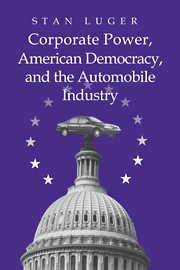Book contents
- Frontmatter
- Contents
- Acknowledgments
- Introduction
- 1 Studying Power in America
- 2 The Structure of the Auto Industry
- 3 Corporate Political Hegemony and Its Decline: 1916–1966
- 4 The Politics of Compromise: 1967–1978
- 5 The Resurgence of Corporate Power: 1979–1981
- 6 The Triumph of Corporate Power: Regulatory Policy, 1981–1988
- 7 The Triumph of Corporate Power: Trade Policy, 1981–1985
- 8 Interregnum: 1989–1996
- Conclusion: Corporate Power and American Democracy
- Index
7 - The Triumph of Corporate Power: Trade Policy, 1981–1985
Published online by Cambridge University Press: 08 October 2009
- Frontmatter
- Contents
- Acknowledgments
- Introduction
- 1 Studying Power in America
- 2 The Structure of the Auto Industry
- 3 Corporate Political Hegemony and Its Decline: 1916–1966
- 4 The Politics of Compromise: 1967–1978
- 5 The Resurgence of Corporate Power: 1979–1981
- 6 The Triumph of Corporate Power: Regulatory Policy, 1981–1988
- 7 The Triumph of Corporate Power: Trade Policy, 1981–1985
- 8 Interregnum: 1989–1996
- Conclusion: Corporate Power and American Democracy
- Index
Summary
During the auto industry's early 1980s financial crisis, industry officials were not content with reversing regulatory standards. They also sought import protection from Japanese cars. Detroit's automakers realized that a new economic environment was taking shape, one that challenged their domination of the American market. At stake was billions of dollars in sales. In 1979, imports had reached a new high at 22.7 percent of the market, up from the previous high of 18.2. In 1980 that figure soared to 28.2 percent. To meet this challenge, Detroit looked to Washington for a political solution in the form of import quotas. As part of its 1981 plan to aid the industry, the Reagan administration granted these requests.
Meanwhile, autoworkers, bearing the brunt of the industry's downturn, sought a political solution to their problems as well. They lobbied for a domestic content law that would have required car manufacturers to proportionally increase the domestic content of cars sold in the United States with increasing sales. The proposal was intended to alter two trends hurting domestic employment: Japanese imports and domestic outsourcing. If Japanese imports were restricted, it was argued, Japanese manufacturers would be encouraged to open auto plants in the United States. At the same time, the law would restrain domestic manufacturers from outsourcing production – opening plants in other countries or buying parts from foreign-based suppliers.
Automotive trade policy during this period reflected the industry's triumphant position. Corporate officials would not have been in a position to obtain import restrictions without the industry's unprecedented downturn.
- Type
- Chapter
- Information
- Corporate Power, American Democracy, and the Automobile Industry , pp. 135 - 153Publisher: Cambridge University PressPrint publication year: 1999

